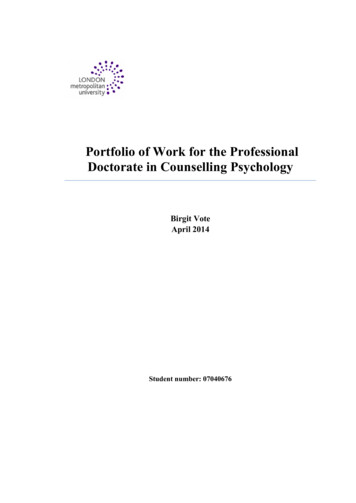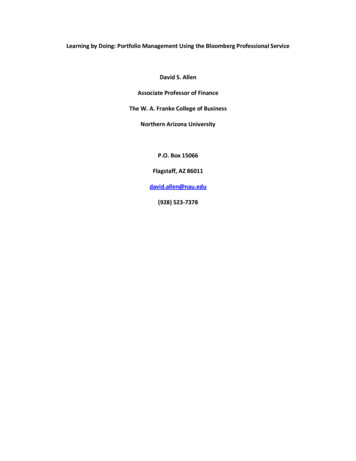
Transcription
Portfolio of Work for the ProfessionalDoctorate in Counselling PsychologyBirgit VoteApril 2014Student number: 07040676
AcknowledgementsFollowing what has been an interesting and challenging process, I would like tothank my Director of Studies, Dr. Mark Donati, and especially my researchsupervisor, Dr. Elaine Kasket, for their invaluable comments, advice and guidancethroughout all stages of my research. I would also like to express my gratitude andthanks to the participants in this research. Without their willingness to share aspectsof their therapeutic practice with me, the research would have not been possible. Iam very grateful to my family for their continuous support throughout my training.Finally, I would like to thank my husband, whose encouragement has been, andcontinues to be, unconditional and inspiring.
Table of ContentsIntroduction to portfolio . 1Component 1 - Empirical research project . 51. Abstract . 62. Introduction . 72.1 Background . 72.2 Reflexive statement I – At the beginning of the research process . 112.3 Context of adoption . 162.4 Literature review . 192.4.1 Psychological impact of adoption . 192.4.2 Psychological support for adult adopted individuals . 262.4.3 Psychodynamic perspectives on adoption . 282.5 Adoption and counselling psychology . 342.6 Summary and research rationale . 362.7 Research questions . 373. Methodology . 383.1 Research design and rationale . 383.1.1 Quantitative and qualitative research . 383.1.2 Interpretative Phenomenological Analysis (IPA) . 393.1.3 Alternatives discounted . 423.2. Ethical considerations. 443.2.1 Ethical approval . 443.2.2 Briefing, debriefing and informed consent . 443.2.3 Confidentiality . 453.3 Participants . 463.3.1 Sample size . 463.3.2 Inclusion criteria . 463.4 Procedure . 473.4.1 Recruitment. 473.4.2 Interview . 473.4.3 Transcription . 493.5 Data analysis . 493.6 Validity and reliability in qualitative research . 513.7 Summary . 544. Analysis . 55Overview . 55Master Theme 1: An awareness of the early rejection in all stages of thetherapeutic process. 56Sub-theme 1a): Walking on eggshells - Therapist's response to the client's fear of rejection . 56Sub-theme 1b): Not letting go of clients . 60Theme summary . 65
Master Theme 2: A personal commitment to provide a corrective emotionalexperience. 65Sub-theme 2a) Personal experience as a driver for working with adult adopted clients . 66Sub-theme 2b) The need to "re-parent" the vulnerable child . 71Sub-theme 2c) Offering adopted clients flexibility in order to keep connected . 75Theme summary . 83Master Theme 3: The psychological consequences of working with adultadopted clients for therapists . 84Sub-theme 3a) "I can't give them that piece of sunshine" - Therapist's heightened emotionalreaction . 84Sub-theme 3b) "A heavy load to carry" - the necessity of looking after oneself . 87Theme summary . 895. Discussion . 905.1. Overview . 905.2. Implications of findings . 905.2.1 How do therapists experience the therapeutic relationship? . 905.2.2 Are there any particular characteristics, challenges or issues? . 965.2.3 Do therapists modify or adapt their practice? . 995.3 Methodological considerations . 1035.3.1 Limitations of the study . 1035.3.2 Suggestions for future research. 1055.4 Reflexive statement II - At the end of the research process . 1065.5 Conclusions . 108References . 109Appendices . 131Appendix 1: Participant information sheet . 132Appendix 2: Email accompanying information sheet . 133Appendix 3: Consent form . 134Appendix 4: Interview schedule (guide) . 135Appendix 5: Debriefing sheet . 136Appendix 6: Collaborating organisation approval . 137Appendix 7: Extract of Karen's transcript . 138Appendix 8: Example of initial table of emerging themes (Karen) . 142Appendix 9: Example of master table with quotes . 144Component 2: Reflective essay . 147Component 3: Theoretical essay . 161Component 4: Process report . 176
Introduction to portfolioThis doctoral thesis portfolio consists of four different areas of counsellingpsychology research and practice. It begins with an empirical piece of research,which explores the therapeutic relationship with adult adoptees as experienced byadoption counsellors. It is followed by a reflective essay, which presents thedevelopment of my personal and professional identity as a counselling psychologist.A theoretical essay will then be presented, which compares and contrasts process andcontent interventions in working with couples and uses clinical examples to illustrateattachment interventions and Murray Bowen's systemic therapeutic approach (1978).Finally, a process report reviews my management of the therapeutic relationship witha client who presented with symptoms of chronic depression and a history ofphysical abuse.Counselling psychology draws upon and develops models of research and practicethat "marry the scientific demand for rigorous empirical enquiry with a firm valuebase grounded in the primacy of the counselling or psychotherapeutic relationship"(British Psychological Society, 2005, p. 1). The British Psychological Society alsostates that counselling psychologists seek "to engage with subjectivity andintersubjectivity, values and beliefs" (p. 1). Throughout each portfolio component,the notion and relevance of the therapeutic relationship is reflected and commentedupon with an emphasis on the subjective and unique experience of the individualrather than attempting to fit an individual into psychotherapeutic theory.However, my way of practising and thinking as a counselling psychologist isnaturally guided by specific therapeutic models, in particular Cognitive BehaviouralTherapy (CBT). Additionally, psychodynamic thinking, which includes the theory ofattachment, seems relevant when formulating process issues in the therapeuticrelationship. I am aware that my way of perceiving, believing and being in the worldis one of many possibilities and that there is no single or ultimate truth or finalconclusion. This also means that my development as a counselling psychologist isalways a work in progress, and this portfolio is therefore a snapshot of my personaland professional development at the point of writing.1
In the following, I will briefly outline the four components of this portfolio andhighlight how the therapeutic relationship and the subjectivity of individualexperiences link the different sections of my work in research and practice.Component 1: Empirical research projectThere is a paucity of qualitative research exploring the experience of the therapeuticrelationship with adult adopted clients from the therapists' point of view. Researchsuggests that human beings "relationality" begins in the mother's womb way beforebirth, but continues throughout life (Righetti, Dell'Avanzo, Grigio, & Nicolini,2005). This is in accordance with one of the suppositions of my research, namelythat early years might be particularly relevant for the individual's capacity to formfulfilling relationships in later life. Therapeutic relationships are influenced by pastrelationships that the client and the therapist have had (Hardy, Cahill, & Barkham,2010). The adopted child has experienced multiple losses, in particular the loss of thebirth mother or primary attachment figure, though the exact combination and theconsequences depend on the individual child and the circumstances of adoption(Hindle & Shulman, 2008).From an adopted individual's perspective, establishing a therapeutic relationship canrevive and re-evoke intense feelings and anxieties in relation to their adoption.However, little is known about whether therapists might experience particular issuesand challenges or whether they engage in modifications to their practice whenworking with adult adopted clients. To explore in depth how six adoptioncounsellors might experience the establishment, maintenance and ending oftherapeutic relationships, semi-structured interviews were conducted and analysedusing Interpretative Phenomenological Analysis (IPA) (Smith, 1996). IPA researchis interested in the individual's sense-making process and tries to seek the meaningsof experiences (Finlay, 2011). This research method strives for a reflective focuswith idiographic sensibility in order to make sense of an individual's livedexperiences and is therefore deemed suitable to use in order to answer the researchquestions.2
Component 2: Reflective essayThis section entails reflections on my experiences during the training programmeand offers some evaluations that consider my own evolving professional identity,which I view as an ongoing process. This essay highlights the importance of beinggrounded in my therapeutic approach, which is CBT. This seems relevant in order tobe attuned to my clients and gives me a set of conceptualisations, theoreticalunderstandings and practical tools and techniques. Equally, I emphasise the need tobe open to other approaches such as humanistic and psychodynamic therapy in orderto facilitate attendance to the therapeutic relationship, depending on the individualclient, in the knowledge that in our lived experience it is not one, but many thingsthat can produce therapeutic change.Component 3: Theoretical essayThis component consists of a theoretical essay that explores couple therapy from afamily systems and psychodynamic perspective. Both theories have the freeing frompast family relationships positioned as a focus point in therapy, as these relationshippatterns can be repetitive and restricting (Gerson, 2010). Primarily, couple therapy isconsidered the treatment for couple distress or for improving couple relationshipsatisfaction. It is a treatment that is established as being effective in this way(Lebow, 2013) as there have been indications, both in research and in clinicalexperience, that individual therapies for couples can often lead to relationship breakup (Gurman & Kniskern, 1986). The needs of some individuals might therefore bebetter met within couple therapy, again emphasising the importance of the subjectiveindividual experience of the client.In this essay, I compare and contrast the Murray Bowen family systems theory(1978) and attachment theory. I present the theoretical underpinnings andcontextualise these within counselling psychology practice.Component 4: Process reportThe final portfolio component comprises a process report, in which I critically reflectupon and evaluate my therapeutic relationship with "Paul" (pseudonym), who3
suffered from symptoms of depression and experienced physical abuse as a child.This report shows the philosophy of utilising multiple theories, with an emphasis onviewing Paul's beliefs and strategies through his developmental history, using CBT,attachment theory and cognitive analytical therapy in an attempt to increase theunderstanding of Paul's difficulties. The therapy excerpt that I commented onfollowed a potential rupture in our therapeutic relationship, and the client describedthe session as a turning point. I felt that this piece of work showed the relevance ofdrawing on additional psychological theories to increase my understanding of thetherapeutic relationship with this client, which might not have been possible byadopting a purely CBT approach. The report also highlights features of theprofession of counselling psychology: The fact that no single model or theoreticalapproach is valued over another (Rizq, 2006) and that the practice of counsellingpsychology relies heavily on the self, interpersonal skills and the therapeutic process(Woolfe, Strawbridge, Douglas, & Dryden, 2010). Its philosophy emphasises that theclient's work is done in relationships, which this report attempts to illustrate.4
Component 1 - Empirical research projectA qualitative analysis of how therapistsexperience the therapeutic relationshipwith adults who were adopted as infantsA thesis submitted to London Metropolitan University inpartialfulfilment of the requirements for the ProfessionalDoctorate inCounselling Psychologyby Birgit Vote5
1. AbstractResearch suggests that adoptees are seen in therapeutic settings in a greaterproportion than their prevalence in the general population (Kennedy Porch, 2007).Few studies concentrate on adult adoptees, and those that do mainly focus onadjustment and the search for / reunion with the birth family rather than on therapyresearch. In particular, there seems to be a lack of empirical and theoreticalunderstanding of the complexities of the therapeutic relationship when working withadults who were adopted. Early experiences can affect an adult's ability to formtrusting relationships with others, including with a therapist.1 Counsellingpsychology, as a discipline, has a particular interest and skill base in understandingthe therapeutic relationship and is therefore in the position to offer a valuablecontribution to research on the therapeutic relationship with an individual who hasbeen adopted as an infant. Through six semi-structured interviews, adoptioncounsellors currently working with adult adoptees were asked to share theirexperiences and understanding of the nature and the role of the therapeuticrelationship. A qualitative methodology guided by Interpretative PhenomenologicalAnalysis (IPA) enabled detailed exploration of the adoption counsellors' perspective.Three master themes were identified in the analysis: An awareness of the earlyrejection in all stages of the therapeutic process; a personal commitment to provide acorrective emotional experience; and the psychological consequences of workingwith adult adopted clients for therapists. The analysis highlighted the challenges thatparticipants perceived in terms of establishing, maintaining and ending thetherapeutic relationship with adoptees. The findings of this study extend the preexisting research base by emphasising the interconnectedness of the personal andprofessional experiences of adoption counsellors and the need for flexibility in theirpractice in each phase of the therapeutic process, predominantly with regard totherapeutic boundaries and engaging in a different ending experience. The themesare discussed in relation to existing literature with an emphasis on attachment theory.The discussion also highlights practical implications, particularly the importance offamiliarisation with aspects of adoption due to their likely influence on thetherapeutic relationship and the need for reflective practice.1To aid readability, the terms therapist and counsellor are used throughout this study and also includeother professionals working in psychotherapeutic practice.6
2. Introduction2.1 BackgroundAdoption has a long history in human civilisation; its existence can be traced back asfar as biblical times (Javier, Baden, Biafora, & Camacho-Gingerich, 2007). A currentdefinition in Western culture views adoption as a fundamental, permanent and legalchange in the life of a child that intends to provide the child with new attachmentfigures and a safe base for childhood and throughout life (Courtney, 2000). Itsimultaneously fulfils the needs of children who need families and families whodesire children (Jones, 1997). Adoption is a multigenerational and ongoing processthat permanently affects the lives of the adoption triad: Adopted child, adoptiveparents and birth parents. The adoption that has been finalised through an adoptionorder is viewed only as the midpoint (Henderson, Sass, & Carlson, 2007) as eachadopted individual has different psychological needs that shift developmentallyacross the life cycle (de Peyer, 2013).There is a variety of different types of adoption, for example within-country(domestic) or international adoption, interracial adoption, adoption by familymembers and adoption at various ages. Thus, adoption refers to a diverse set offamily circumstances, and generalisations about adoption must be made cautiously(Grotevant, 2003). A distinction has to be made between special guardianship andstep-parent adoption. Special guardianship was introduced in 2005 and while thispromotes a permanent relationship between the child and the special guardian(Department for Education and Skills, 2005), it maintains the legal link betweenbirth parents and children. While step-parent adoption is legally binding, it is likelyto be experienced differently than other forms of adoption.It is also important to understand the distinctions among closed, open and semi-openadoptions, as these differences can influence the adoptee in how they experiencebeing an adopted individual at each stage of their life.Closed adoption means that the adopted person and their family have no contact withthe birth family unless a search is initiated, which usually happens in adulthood.7
These adoptions are becoming less common, but many of today's adult adoptees areinvolved in closed adoptions (Corder, 2012).Open adoptions have taken place when the adoptee and their family have contactwith the birth family through letters, pictures or face-to-face visits. This form ofadoption is more common nowadays (Siskind, 2006). Open adoptions varyconsiderably in terms of the amount of contact that takes place, but generally,adoptees know the names of their birth parents and have some form of contact withthem or at least the potential to have contact.In semi-open adoptions, birth families and adoptive parents do not exchangeidentifying information, such as their last name or where they live. All information isgenerally sent through an intermediary, such as an agency or a legal representative.Often, letters and pictures are sent on a routine basis, for example once a year(Corder, 2012).The type of contact however does not necessarily entail an open communication withthe adopted child about their adoptive status. Furthermore, within the researchcommunity, notions of 'openness of attitude' (Fratter, 1996) and 'communicativeopenness' (Brodzinsky, 2005) - the openness of adoptive parents in thinking andtalking about adoption, have been identified as equally, if not more important thanwhat kind of contact takes place. Some of the important responsibilities for adoptiveparents are sharing adoption information with their children, helping themunderstand the meaning and implications of being adopted, and supporting them intheir efforts to cope with feelings related to their family status, including thoseconnected to loss (Brodzinsky, 2011).Many adoptees never seek or require counselling, but empirical research has found ahigher proportion of adopted persons in therapy (17.71%) than of non-adoptedpersons (8.67%; Miller et al., 2000). Also, studies have reported greater referral ratesfor adoptees to psychological services than for their non-adopted counterparts (forexample, Borders, Penny, & Portnoy, 2000; Jones, 1997; Juffer & Van Ijzendoom,2005).8
The support for adult adoptees varies across England. The first independent postadoption service in England was the Post-Adoption Centre (PAC) in London in1986. Since then, independent post-adoption services have been established invarious parts of the country, although not all of England is covered by such provision(Harris, 2004). The PAC provides a range of post-adoption services to anyoneinvolved in adoption. The PAC currently employs, for example, counsellors, afamily therapist and a counselling psychologist.The work is supplemented bysessional workers, consultants and volunteers. Funded primarily by the subscriptionof local authority social services departments, the agency provides a core service topeople with personal experience of adoption who live in a subscribing local authorityarea. The range of core services includes telephone advice, telephone and face-toface counselling, training events for professionals, work with adoptive and birthparents and adopted children, and the provision of a venue for post-adoption contactand support groups.Another post-adoption organisation is After Adoption, who merged in 2012 withanother voluntary agency called Adoption Support. Since 1994, the organisationprovides independent support for anyone affected by adoption including developingintermediary work and supporting birth parents and relatives in parts of England andWales. Similar to the PAC, it provides free core services to people, who live insubscribing boroughs or whose adoption was arranged there. The organisation offers,for example, tracing, access to adoption records, individual and group work withbirth parents, life story work, counselling to address issues raised by adoption andintermediary services for those making contact with their children.Sass and Henderson (2002) reported that a common topic at adoption support groupmeetings is disappointment with therapists who were either not informed aboutadoption or downplayed the importance of adoption in a client's life. On a similarnote, Brodzinsky, Smith, and Brodzinsky (1998) claimed that the therapist's modalityis of minor importance when working with the adopted person. According to theseauthors, it is more important to have a clear understanding of the adoption-relatedissues that are likely to emerge in the course of treatment and that can affect thetherapeutic relationship.9
There is a variety of terms to conceptualise the therapeutic relationship, includingworking relationship, alliance, therapeutic alliance, therapeutic bond and workingalliance (Hardy et al., 2010). For the purposes of this research, the term therapeuticrelationship will be used for ease. The therapeutic relationship is seen as a centralpoint in the philosophy of counselling psychology, which means that the clients'presenting issues are heard and aimed to be understood in the therapeuticrelationship (James, 2009). A good relationship between client and therapist isconsidered to be the base from which all therapeutic work takes place (Hardy et al.).In recent years, much research in mainstream psychology has focused on thetherapeutic relationship in therapy: "the quality and strength of the collaborativerelationship between client and therapist in therapy" (Hovarth & Bedi, 2002, p. 41).A substantial body of evidence suggests that the quality of the therapeuticrelationship is one of the key factors in determining outcomes in therapy (Cooper,2005), accounting for approximately 30 per cent of the therapeutic outcomes acrosstheoretical orientations (Assay & Lambert, 1999).So far, counselling psychologists have not made extensive contributions to the fieldof adoption, even though, as this thesis suggests, they have much to offer that couldextend adoption counselling literature. A series of articles in the American journalThe Counseling Psychologist (one overview article and two detailed reviews) had thepurpose of increasing awareness of the psychological and sociocultural issuesinvolved in adoption and to provide frameworks for research in this domain. It alsoaimed to promote an understanding of empirical research in this area and to identifyfuture theoretical, research and practice directions for the study of adoption, to whichcounselling psychologists can make a useful contribution (Zamostny, Wiley,O'Brien, Lee, & Baden, 2003). Baden and Miller (2007) concluded several yearslater that counselling psychology needs research that addresses questions related tothe lifelong effects of relinquishment and adoption on adults. Clinical themes inadoption overlap with "traditional" counselling psychology themes, for examplerelationship and attachment processes, coping skills enhancement, coping with lossand transition and transcultural issues (Zamostny et al., 2003). These are all themesthat are extensively discussed in the current edition of the Handbook of CounsellingPsychology (Woolfe et al., 2010).10
This study suggests that adoption is of interest to counselling psychologists and thatthe therapeutic relationship with adult adoptees as experienced by adoptioncounsellors is relevant for the profession generally and for individual counsellingpsychologists and other helping professions that work with adult adoptees inparticular.The thesis is structured as follows: The reflexive statement will outline my ownpersonal and professional stance towards adoption and how I anticipated andmanaged my influence on the research process and data. This is followed by aliterature review that aims to provide a specific context for my research and will leadon to define the research gap and concludes wi
Introduction to portfolio This doctoral thesis portfolio consists of four different areas of counselling psychology research and practice. It begins with an empirical piece of research, which explo











